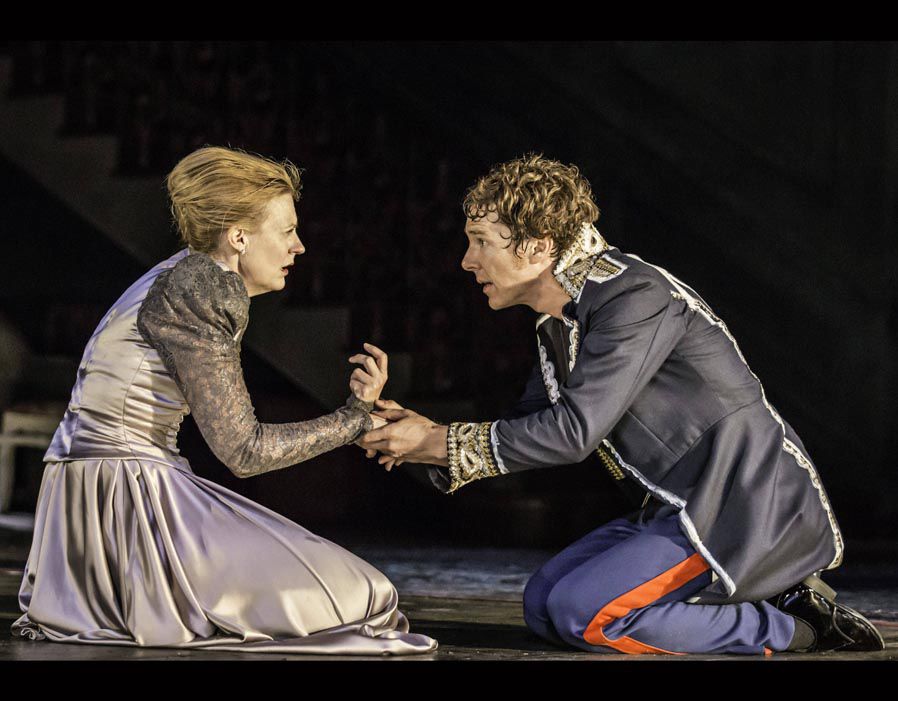Hamlet, Barbican Theatre, EC2Y
reviewed for The Times, 6 August 2015
The Times ran several cuts of this text in different editions: this is the full text, as filed. The Times also published a leader on the decision to review a preview, here, and the newspaper always speaks best for itself. This was a quick review for the overnight edition, but I also had a chance to write a longer, more reflective review, later in the run.
Alas, poor Benedict. It’s hard to flatten Hamlet: he is, after all, Shakespeare’s most quicksilver creation. As he wrestles with whether or not to avenge his father’s murder, our prince touches on sin, fate, truth, beauty – what he doesn’t do, as far as I recall, is distill three hours’ worth of philosophy into a Nat King Cole cliché. Benedict Cumberbatch has all the energy Hamlet requires, sweating around the Barbican stage like an oleaginous electric eel, but there’s little subtlety in this performance. Mourning his father, Cumberbatch gurns beside his gramophone, from which a sonorous voice repeatedly intones that the greatest thing we’ll ever do ‘is just to love and be loved in return’. This is Hamlet for kids raised on Moulin Rouge.
The official press night, of course, is not until 25th August: The Times is, as ever, in at the action early, and this review comes straight from Cumberbatch’s first preview. Most actors get a few weeks to warm up before the buzz really starts, and it’s certainly unfair to dig at technical slips at this stage, but with hardened Cumber-fans tweeting images from the first preview all over Twitter, and the Barbican itself happily RTing audience comments, Lyndsey Turner’s production was never going to escape early scrutiny.
And this is a production aimed squarely at the Cumber-fan, right down to the artistically indefensible decision to open the production with Hamlet’s most famous soliloquy, ‘To Be Or Not To Be’. We should meet Hamlet, grieved, but not yet enraged by the revelation that his father’s death was down to evil uncle Claudius. It is only the revelation of this, by his father’s ghost, that leads him to despair – his mediation on suicide finds him at rock-bottom, towards the middle of the play. Instead, as soon as we meet Cumberbatch’s Hamlet, he launches straight into full on self-loathing. To Be Or Not To Be should be the character’s emotional low point: instead, five minutes into the play, we’ve nowhere further for him to go. Imagine a production of Turandot, which moved the climactic Nessun Dorma to the opening number, just because, post-Pavarotti every football fan can sing along.
It’s symptomatic of a show guided primarily by the principle of highlighting Cumberbatch at every possible moment. Literally. He’s bathed in a halo of light as he delivers soliloquies, the rest of the cast swirling in slow-motion behind him. The rest of Lyndsey Turner’s big-budget production owes every bit as much to cinema. The shallow alcove from which Cumberbatch first addresses us falls away to reveal a world of Edwardian splendour: King Claudius’ opening feast is a ghostly banquet, not miles away from The Woman In Black. When Karl Johnson’s Ghost appears, the walls behind writhe with dark slime and rotting vegetation from Alien; as grit explodes over the set, a funeral procession emerges for Ophelia looking like a zombie parade. The more serious price we pay for Devlin’s cinematic preset is to lose the crucial first scene on Elsinore’s battlements (an opening scene without Cumberbatch on stage seemingly inconceivable).
Cumberbatch himself doesn’t seem able to dial down the hyper-activity until late in the second act. There’s little stillness or quietude here. This leaves Anastasia Hille’s queenly, frazzled Gertrude with our most engaging emotional journey, her ‘accidental’ poisoning a resolute suicide; Ciaran Hinds, too, as Claudius, provides a necessary dignity. Sian Brooke is an affecting Ophelia, Rudi Dharmalingam and and Matthew Steer a sympathetically hapless Guildenstein and Rosencrantz, the former endearingly pairing sneakers with his dress uniform. Talented, gangly Leo Bill, is woefully underused as Horatio, not least due to the loss of that night-watch opening. His is not the only wasted opportunity here. Pure theatrical self-indulgence.







